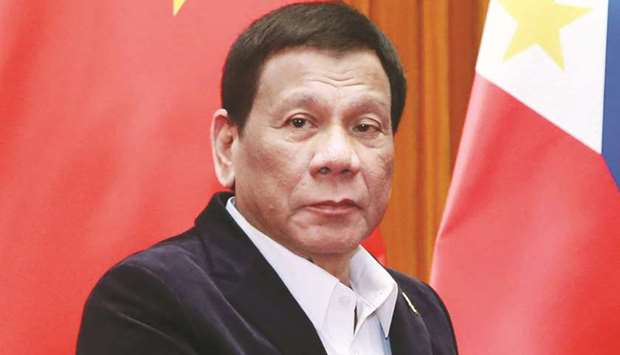Philippine President Rodrigo Duterte will not co-operate with an investigation into the country’s bloody war on drugs planned by the International Criminal Court (ICC), his spokesperson said yesterday while defending the administration’s record on human rights.
Rights groups and critics of the drug killings have welcomed the step by the ICC, saying a full-scale investigation will bring justice closer for the families of thousands of people killed.
Despite concerns from the international community about the crackdown on drugs, Duterte remains popular at home and many Filipinos back his tough stance on crime.
“We will not co-operate because we are no longer a member,” the president’s spokesperson Harry Roque told a news conference.
Duterte cancelled the Philippines’ membership of the ICC’s founding treaty in March 2018, although, under its statute, the ICC has jurisdiction for crimes committed while a country was a member until a year after it sought to withdraw.
“We do not need foreigners to investigate killings in the drug war because the legal system is working in the Philippines,” Roque said, adding he believed launching a formal probe was “legally erroneous and politically motivated.”
An ICC prosecutor sought authorisation on Monday to open a full investigation into the killings, saying crimes against humanity could have been committed.
“There is a reasonable basis to believe that the alleged conduct was committed as part of a widespread and systematic attack directed against a civilian population pursuant to or in furtherance of a state policy,” ICC chief prosecutor Fatou Bensouda said in a report.
The investigation will cover the period of July 2016 to March 2019 when at least 20,000 killings were committed in connection with the anti-narcotics campaign.
A series of reports filed by the media in 2016 and 2017 exposed the brutal killings being carried out in the Philippines as part of the war on drugs.
Many of these stories were referred to in the ICC report.
Since Duterte took office in 2016 until the end of April this year, police have killed more than 6,100 suspected drug dealers in sting operations, government data show.
“The long arm of the law will soon catch up with Duterte and his accomplices,” former opposition senator Antonio Trillanes said in a statement. The International Coalition for Human Rights in the Philippines said in a statement: “The perpetrators and architects of these crimes must be held to account.”
The foreign ministry in Manila said the Philippines adhered to norms on human rights and had a “long track record of constructive engagement with international and regional partners.”

(File photo) Philippine President Rodrigo Duterte.
